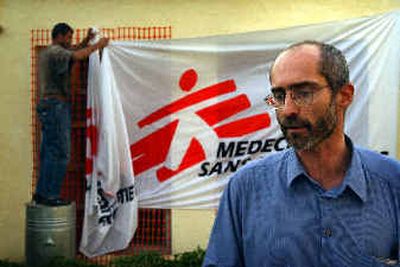Bomb attack kills 6 at Afghan mosque

NEW DELHI – A bomb blast Wednesday killed six people in a mosque, including two U.N. workers registering Afghan voters, in an area of southeast Afghanistan where U.S.-led forces frequently have battled Taliban fighters and their allies.
The attack came on the same day that the Nobel Prize-winning aid group, Doctors Without Borders, announced it was pulling out of the war-scarred nation, citing factors including deteriorating security and dissatisfaction with an ongoing investigation into the early June slaying of five of its staffers in northwest Afghanistan.
The deaths Wednesday resulted from the detonation of an improvised explosive device as employees from the U.N. Assistance Mission in Afghanistan were registering voters for the country’s Oct. 9 presidential poll, the U.S.-led military coalition said.
Two additional U.N. staff members who were injured in the Ghazni province attack were flown by U.N. helicopter to a U.S. military field hospital at Bagram air base, north of Kabul, the military said in a statement.
At least 30 Afghan and foreign aid workers have been killed in Afghanistan this year.
Despite the violence and intimidation, roughly 7.5 million Afghans, out of an estimated 10 million eligible to register, have placed their names on voters lists. Roughly 40 percent of them are women.
The election, the country’s first in decades, was originally set for June, but was postponed until September and delayed again until Oct. 9 as officials struggled to deal with logistical problems and growing security problems in large areas of the country.
A total of 23 candidates have registered to run for president, with interim President Hamid Karzai the front-runner and former education minister Younis Qanooni providing a last-minute challenge. More complicated parliamentary elections have been postponed until April.
The departure of Doctors Without Borders, also called Medecins sans Frontieres, which has provided service in Afghanistan for more than two decades, is due to take place within two weeks.
While the decision serves as another indication of instability in Afghanistan, many other aid groups remain and the United Nations continues to undertake aid work, although it has stopped many operations in southern and eastern regions where the Taliban insurgency remains strongest.
In its withdrawal announcement, Doctors Without Borders criticized the U.S.-led military forces in Afghanistan for using social aid to carry out what it said was a military “hearts and minds” campaign, a move the group says has put civilian humanitarian workers in harm’s way.
In May, according to the group, coalition forces distributed leaflets in Taliban strongholds of southern Afghanistan showing a picture of an Afghan girl carrying a bag of wheat along with a call for information on the Taliban or its allies.
Doctors Without Borders said the leaflets made a clear link “between the provision of humanitarian aid and the military aims of the coalition and thereby represent an unacceptable assault on humanitarian principles.”
U.S. and other NATO troops also have set up small units, called Provincial Reconstruction Teams, in several cities and outlying areas to work with local officials and people to rebuild after decades of war. Civilian aid groups have complained that the military teams blur the lines between soldiers and civilian aid workers, leaving civilian groups in increased danger of attack by insurgents.
The U.S.-led coalition repeatedly has said its reconstruction teams are doing crucial work in the multibillion-dollar rebuilding of Afghanistan’s physical and administrative infrastructure.
There are more than 20,000 troops from the United States and other North Atlantic Treaty Organization countries, but insurgent attacks steadily have increased in recent months.
On Friday, NATO ambassadors meeting in Brussels, Belgium, agreed to send 2,500 more troops, still short of the 3,500 reinforcements the alliance has promised to send.
The humanitarian group also said Wednesday it was dissatisfied with the Afghan government’s investigation into the June 2 shooting deaths of its staffers – two Afghans, a Belgian, a Dutchman and a Norwegian – on June 2.
The workers were traveling in a Toyota Land Cruiser in Afghanistan’s northwest Badghis province when they were fired on from various directions, the aid agency said. Grenade shrapnel also was found in the bullet-riddled vehicle, the agency said, adding that it was not a robbery attempt because nothing was stolen from the car.
Someone claiming to be a Taliban spokesman claimed the hard-line Islamic militia carried out the attack because it represented “U.S. interests.” But the Taliban are most active in the south and east of Afghanistan, not northwest Badghis province, and Doctors Without Borders said “credible evidence” pointed to local militia commanders, whom Afghan authorities have not arrested.
“Having worked nearly without interruption alongside the most vulnerable Afghan people since 1980, it is with outrage and bitterness that we take the decision to abandon them,” Marine Buissonniere, the group’s secretary-general, said in a statement. “We simply cannot sacrifice the security of our volunteers while warring parties seek to target and kill humanitarian workers.”
The aid group, which has 80 foreign and 1,400 local staff in Afghanistan, said it will hand over its operations to the country’s health ministry and other agencies in the coming weeks.